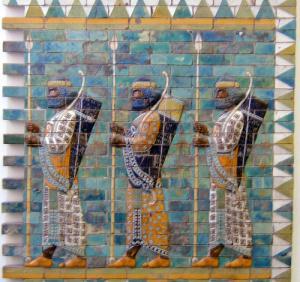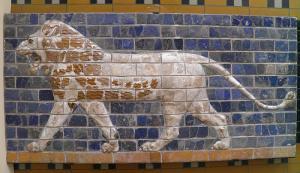“And the Lord God of their fathers sent warnings to them by His messengers, rising up early and sending them, because He had compassion on His people and on His dwelling place.But they mocked the messengers of God, despised His words, and scoffed at His prophets, until the wrath of the Lord arose against His people, till there was no remedy. Therefore He brought against them the king of the Chaldeans, who killed their young men with the sword in the house of their sanctuary, and had no compassion on young man or virgin, on the aged or the weak; He gave them all into his hand. And all the articles from the house of God, great and small, the treasures of the house of the Lord, and the treasures of the king and of his leaders, all these he took to Babylon. Then they burned the house of God, broke down the wall of Jerusalem, burned all its palaces with fire, and destroyed all its precious possessions.And those who escaped from the sword he carried away to Babylon, where they became servants to him and his sons until the rule of the kingdom of Persia,to fulfill the word of the Lord by the mouth of Jeremiah, until the land had enjoyed her Sabbaths. As long as she lay desolate she kept Sabbath, to fulfill seventy years.” 2 Chronicles 36:15-21
 In our last post about ancient Israel, I shared that there was enough archaeological evidence about Assyria taking Israel captive for me to continue investigating the claims of the Bible. I was an ardent atheist and journalist in search of the truth.
In our last post about ancient Israel, I shared that there was enough archaeological evidence about Assyria taking Israel captive for me to continue investigating the claims of the Bible. I was an ardent atheist and journalist in search of the truth.
The next step in the investigation was to see what archaeological support there was for Babylon defeating Judah, taking the people captive and destroying the capital city, Jerusalem.
The Bible claims that King Josiah of Judah was killed in battle with the Egyptian army at Megiddo. Necho is mentioned as the pharaoh at the time. Dating of the kings of Judah from Solomon to Josiah puts the date of Josiah’s death at about 609 BC. It goes on to say that the people of Judah made Josiah’s 23-year-old son Jehoahaz king in his father’s place. According to the Bible, Pharaoh Necho put Jehoahaz in prison at Riblah in the land of Hamath after just three months on the throne and that Jehoahaz died in Egypt. Necho made Josiah’s 25-year-old son Eliakim Judah’s king and changed his name to Jehoiakim. Jehoiakim ruled for 11 years, but was a vassal of Egypt until Babylon took Judah from the Egyptians. The Bible claims Jehoiakim was King Nebuchadnezzar’s vassal for three years, but then rebelled against him.
“And the Lord sent against him raiding bands of Chaldeans, bands of Syrians, bands of Moabites, and bands of the people of Ammon; He sent them against Judah to destroy it, according to the word of the Lord which He had spoken by His servants the prophets.” 2 Kings 24:2
Jehoiakim died and his 18-year-old son Jehoiachin became king. He reigned in Jerusalem for three months and ten days. King Nebuchadnezzar summoned the young king to Babylon and made Jehoiakim’s 21-year-old brother Zedekiah king of Judah. He ruled as a vassal king for 11 years, but also rebelled against Nebuchadnezzar. The Bible says that in the ninth year of Zedekiah’s reign, in the tenth month on the tenth day of the month, King Nebuchadnezzar and his army came against Jerusalem and built a siege wall all around the city. By the ninth day of the fourth month, according to the Bible, the famine had become so severe in Jerusalem that there was no food for the people. Judah’s army broke through the city wall and fled, but Babylonian soldiers captured Zedekiah in the plains of Jericho and took him to Nebuchadnezzar at Riblah. The soldiers killed Zedekiah’s sons, then put out his eyes, put him in fetters and took him captive to Babylon.
What happened next, again according to the Bible, was the destruction of Jerusalem by the army of Babylon.
“And in the fifth month, on the seventh day of the month (which was the nineteenth year of King Nebuchadnezzar king of Babylon), Nebuzaradan the captain of the guard, a servant of the king of Babylon, came to Jerusalem. He burned the house of the Lord and the king’s house; all the houses of Jerusalem, that is, all the houses of the great, he burned with fire. And all the army of the Chaldeans who were with the captain of the guard broke down the walls of Jerusalem all around. Then Nebuzaradan the captain of the guard carried away captive the rest of the people who remained in the city and the defectors who had deserted to the king of Babylon, with the rest of the multitude … Thus Judah was carried away captive from its own land.” 2 Kings 25:8-11, 21
History and Archaeology
The Bible makes a lot of historical claims concerning Judah and Babylon, so it should be easy to show that the Bible is not historical at all but filled with myths and legends. Right?
By the time I arrived at this point in my investigation 44 years ago, I had already seen strong evidence that the Bible was in fact historical rather than mythical. Would it prove itself so once again?
We’ve already seen that the Hebrew and Assyrian timelines agree about Assyria’s defeat of the northern kingdom of Israel in 722 BC. The Hebrew (Old Testament) timeline would put Babylon’s defeat of Zedekiah and destruction of Jerusalem about 586 BC. How does that square with ancient history and archaeology?
Babylon became a major empire toward the end of the 7th century BC under the leadership of Nabopolassar and his son, Nebuchadrezzar II. The ruins of Babylon are located about 55 miles south of Baghdad, Iraq, near the town of Al-Hillah.
 Some of the archaeological finds supporting Nebuchadnezzar as king of Babylon during the end of the 7th century and beginning of the 6th century BC and the Babylonian Captivity are:
Some of the archaeological finds supporting Nebuchadnezzar as king of Babylon during the end of the 7th century and beginning of the 6th century BC and the Babylonian Captivity are:
Brick of Nebuchadnezzar II
Cylinder of Nebuchadnezzar II
Gold Delivery Tablet
Babylonian Chronicle Tablet
Nebo-Sarsekim Tablet
Bronze Door Slab with Inscription
Lachish Letter I
Lachish Letter II
Archaeology and Babylonian Captivity
The Bible and Nebuchadnezzar
Several Books of the Bible record details of King Nebuchadnezzar’s defeat of Judah. They include:
2 Kings – “At that time the servants of Nebuchadnezzar king of Babylon came up against Jerusalem, and the city was besieged.”
1 Chronicles – “Jehozadak went into captivity when the Lord carried Judah and Jerusalem into captivity by the hand of Nebuchadnezzar.”
2 Chronicles – “Nebuchadnezzar king of Babylon came up against him, and bound him in bronze fetters to carry him off to Babylon.Nebuchadnezzar also carried off some of the articles from the house of the Lord to Babylon, and put them in his temple at Babylon.”
Ezra – “But because our fathers provoked the God of heaven to wrath, He gave them into the hand of Nebuchadnezzar king of Babylon, the Chaldean, who destroyed this temple and carried the people away to Babylon.”
Nehemiah – “These are the people of the province who came back from the captivity, of those who had been carried away, whom Nebuchadnezzar the king of Babylon had carried away, and who returned to Jerusalem and Judah, everyone to his city.”
Esther – “Kish had been carried away from Jerusalem with the captives who had been captured with Jeconiah king of Judah, whom Nebuchadnezzar the king of Babylon had carried away.”
Jeremiah – “And afterward,’ says the Lord, ‘I will deliver Zedekiah king of Judah, his servants and the people, and such as are left in this city from the pestilence and the sword and the famine, into the hand of Nebuchadnezzar king of Babylon, into the hand of their enemies, and into the hand of those who seek their life; and he shall strike them with the edge of the sword. He shall not spare them, or have pity or mercy.”
Ezekiel – “For thus says the Lord God: ‘Behold, I will bring against Tyre from the north Nebuchadnezzar king of Babylon, king of kings, with horses, with chariots, and with horsemen, and an army with many people.”
Daniel – “In the third year of the reign of Jehoiakim king of Judah, Nebuchadnezzar king of Babylon came to Jerusalem and besieged it.”
The Prophets and Nebuchadnezzar
Jeremiah, Ezekiel and Daniel were Hebrew prophets during the reign of Nebuchadnezzar. What, if any, archaeological finds support these three prophets and what they prophesied? We’ll see next time as we continue our investigation into ‘Convince Me There’s A God.’
Scripture taken from the New King James Version®. Copyright © 1982 by Thomas Nelson. Used by permission. All rights reserved.

